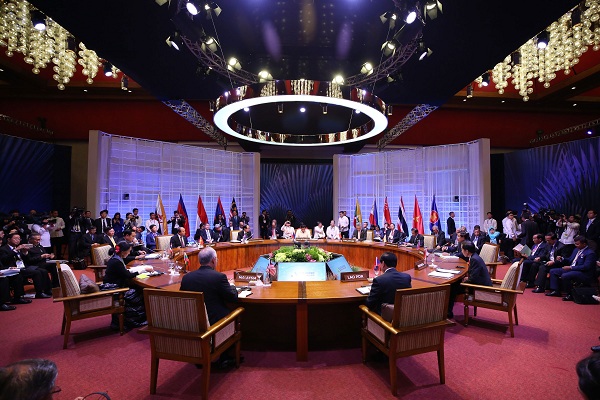Hendrik_2000
Lieutenant General
ASEAN accept the reality on the ground of Chinese present in SCS to the disappointment of warmonger and self serving agenda of outside party
ASEAN accepting South China Sea as China's lake, says analyst
(philstar.com) | Updated April 29, 2017 - 9:42pm
16 365 googleplus0 0

Leaders of the Association of Southeast Asian Nations gather for a plenary session of the biyearly summit in Manila, Philippines on Saturday, April 29, 2017. An Australian analyst said that despite the progress ministers of southeast Asian nations perceive the South China Sea had effectively become Beijing's "lake." ASEAN50/Released
MANILA, Philippines — A draft Association of Southeast Asian Nations (ASEAN) chairman statement shows that the regional bloc is gradually accepting that the South China Sea has become "China's lake," an analyst said.
Carlyle Thayer, emeritus professor at University of New South Wales in Canberra, said that President Rodrigo Duterte, as this year's ASEAN chair, missed the opportunity to insert a reference to the ruling issued by a United Nations-backed tribunal on the disputed waters.
"In sum, although some ASEAN ministers feel progress is being made on managing maritime disputes in the South China Sea, the reality is that ASEAN is gradually accepting that the South China Sea has become China’s lake," Thayer said in an analysis released by his firm.
The draft statement dropped any mention of "non-militarization and self-restraint in the conduct of all activities including land reclamation" which was included in last year's chairman's statement.
"We shared the serious concerns expressed by some leaders over recent developments and escalation of activities in the area which may further raise tensions and erode trust and confidence in the region," the current draft read.
Thayer noted that Duterte's statement noted the importance of a full and effective implementation of the Declaration on Conduct of Parties (DOC) in the South China Sea, which has been said before.
A new development this year is that Duterte pointed out a "significant process" on a framework for the code of conduct in the South China Sea.
"First, the draft states that ASEAN welcomed the cooperation and constructive dialogue on maritime issues of common interest and concern, including search and rescue, maritime capacity building, crimes at sea, maritime scientific research, maritime security and piracy," Thayer said.
The draft statement, however, does not mention safety of navigation and communication at sea which was included in the 2002 DOC.
"Duterte’s draft notes the urgency to continue the development of linkages in maritime security and cooperation under the domain of the ASEAN Maritime Forum, Expanded ASEAN Maritime Forum, ASEAN Regional Forum and the ASEAN Defense Minister’s Meeting," the analyst said.
These ASEAN-related bodies, on the other hand, have not effectively addressed Chinese activities in the South China Sea.
The chairman's statement this year weakened the 10-member regional bloc's resistance against Chinese expansionism in the contested waters.
Duterte earlier said that there is no point in pressing China to comply with the international tribunal's ruling and stressed that it is not an issue in the ASEAN.
Accommodating China?
With the changes to the draft that had happened in the past few days it was clear that Duterte, this year’s chairman of the leaders’ meeting being hosted in Manila, was attempting to accommodate China’s demand to remove or water down references to issues Beijing was quite sensitive to, Thayer said.
The expert argued the president’s statement noted the urgency to continue linking in terms of maritime security and cooperation under the domain of the ASEAN Maritime Forum, Expanded ASEAN Maritime Forum, ASEAN Regional Forum and ASEAN Defense Minister’s Meeting, none of these bodies had effectively addressed Chinese construction and militarization of artificial islands in the South China Sea.
Thayer said that the current draft closely followed last year’s statement, dropping any mention of “non-militarization and self-restraint in the conduct of all activities including land reclamation.” These words were replaced by “and escalation of activities in the area,” according to Thayer.
According to Thayer, the statement notes “serious concerns expressed by some leaders over recent developments.” — with Audrey Morallo
ASEAN accepting South China Sea as China's lake, says analyst
(philstar.com) | Updated April 29, 2017 - 9:42pm
16 365 googleplus0 0

Leaders of the Association of Southeast Asian Nations gather for a plenary session of the biyearly summit in Manila, Philippines on Saturday, April 29, 2017. An Australian analyst said that despite the progress ministers of southeast Asian nations perceive the South China Sea had effectively become Beijing's "lake." ASEAN50/Released
MANILA, Philippines — A draft Association of Southeast Asian Nations (ASEAN) chairman statement shows that the regional bloc is gradually accepting that the South China Sea has become "China's lake," an analyst said.
Carlyle Thayer, emeritus professor at University of New South Wales in Canberra, said that President Rodrigo Duterte, as this year's ASEAN chair, missed the opportunity to insert a reference to the ruling issued by a United Nations-backed tribunal on the disputed waters.
"In sum, although some ASEAN ministers feel progress is being made on managing maritime disputes in the South China Sea, the reality is that ASEAN is gradually accepting that the South China Sea has become China’s lake," Thayer said in an analysis released by his firm.
The draft statement dropped any mention of "non-militarization and self-restraint in the conduct of all activities including land reclamation" which was included in last year's chairman's statement.
"We shared the serious concerns expressed by some leaders over recent developments and escalation of activities in the area which may further raise tensions and erode trust and confidence in the region," the current draft read.
Thayer noted that Duterte's statement noted the importance of a full and effective implementation of the Declaration on Conduct of Parties (DOC) in the South China Sea, which has been said before.
A new development this year is that Duterte pointed out a "significant process" on a framework for the code of conduct in the South China Sea.
"First, the draft states that ASEAN welcomed the cooperation and constructive dialogue on maritime issues of common interest and concern, including search and rescue, maritime capacity building, crimes at sea, maritime scientific research, maritime security and piracy," Thayer said.
The draft statement, however, does not mention safety of navigation and communication at sea which was included in the 2002 DOC.
"Duterte’s draft notes the urgency to continue the development of linkages in maritime security and cooperation under the domain of the ASEAN Maritime Forum, Expanded ASEAN Maritime Forum, ASEAN Regional Forum and the ASEAN Defense Minister’s Meeting," the analyst said.
These ASEAN-related bodies, on the other hand, have not effectively addressed Chinese activities in the South China Sea.
The chairman's statement this year weakened the 10-member regional bloc's resistance against Chinese expansionism in the contested waters.
Duterte earlier said that there is no point in pressing China to comply with the international tribunal's ruling and stressed that it is not an issue in the ASEAN.
Accommodating China?
With the changes to the draft that had happened in the past few days it was clear that Duterte, this year’s chairman of the leaders’ meeting being hosted in Manila, was attempting to accommodate China’s demand to remove or water down references to issues Beijing was quite sensitive to, Thayer said.
The expert argued the president’s statement noted the urgency to continue linking in terms of maritime security and cooperation under the domain of the ASEAN Maritime Forum, Expanded ASEAN Maritime Forum, ASEAN Regional Forum and ASEAN Defense Minister’s Meeting, none of these bodies had effectively addressed Chinese construction and militarization of artificial islands in the South China Sea.
Thayer said that the current draft closely followed last year’s statement, dropping any mention of “non-militarization and self-restraint in the conduct of all activities including land reclamation.” These words were replaced by “and escalation of activities in the area,” according to Thayer.
According to Thayer, the statement notes “serious concerns expressed by some leaders over recent developments.” — with Audrey Morallo

